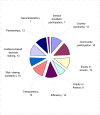National health financing policy in Eritrea: a survey of preliminary considerations
- PMID: 22929308
- PMCID: PMC3517356
- DOI: 10.1186/1472-698X-12-16
National health financing policy in Eritrea: a survey of preliminary considerations
Abstract
Background: The 58th World Health Assembly and 56th WHO Regional Committee for Africa adopted resolutions urging Member States to ensure that health financing systems included a method for prepayment to foster financial risk sharing among the population and avoid catastrophic health-care expenditure. The Regional Committee asked countries to strengthen or develop comprehensive health financing policies. This paper presents the findings of a survey conducted among senior staff of selected Eritrean ministries and agencies to elicit views on some of the elements likely to be part of a national health financing policy.
Methods: This is a descriptive study. A questionnaire was prepared and sent to 19 senior staff (Directors) in the Ministry of Health, Labour Department, Civil Service Administration, Eritrean Confederation of Workers, National Insurance Corporation of Eritrea and Ministry of Local Government. The respondents were selected by the Ministry of Health as key informants.
Results: The key findings were as follows: the response rate was 84.2% (16/19); 37.5% (6/16) and 18.8% said that the vision of Eritrean National Health Financing Policy (NHFP) should include the phrases 'equitable and accessible quality health services' and 'improve efficiency or reduce waste' respectively; over 68% indicated that NHFP should include securing adequate funding, ensuring efficiency, ensuring equitable financial access, protection from financial catastrophe, and ensuring provider payment mechanisms create positive incentives to service providers; over 80% mentioned community participation, efficiency, transparency, country ownership, equity in access, and evidence-based decision making as core values of NHFP; over 62.5% confirmed that NHFP components should consist of stewardship (oversight), revenue collection, revenue pooling and risk management, resource allocation and purchasing of health services, health economics research, and development of human resources for health; over 68.8% indicated cost-sharing, taxation and social health insurance as preferred revenue collection mechanisms; and 68.75% indicated their preferred provider payment mechanism to be a global (lump sum) budget.
Conclusion: This study succeeded in gathering the preliminary views of senior staff of selected Eritrean ministries and agencies regarding the likely elements of the NHFP, i.e. the vision, objectives, components, provider payment mechanisms, and health financing agency and its governance. In addition to stakeholder surveys, it would be helpful to inform the development of the NHFP with other pieces of evidence, including cost-effectiveness analysis of health services and interventions, financial feasibility analysis of financing options, a survey of the political and professional acceptability of financing options, national health accounts, and equity analyses.
Figures





Similar articles
-
The fall and rise of cost sharing in Kenya: the impact of phased implementation.Health Policy Plan. 1996 Mar;11(1):52-63. doi: 10.1093/heapol/11.1.52. Health Policy Plan. 1996. PMID: 10155878
-
A systematic review of the health-financing mechanisms in the Association of Southeast Asian Nations countries and the People's Republic of China: Lessons for the move towards universal health coverage.PLoS One. 2019 Jun 14;14(6):e0217278. doi: 10.1371/journal.pone.0217278. eCollection 2019. PLoS One. 2019. PMID: 31199815 Free PMC article.
-
Characteristics and Effects of Multiple and Mixed Funding Flows to Public Healthcare Facilities on Financing Outcomes: A Case Study From Nigeria.Front Public Health. 2020 Jan 15;7:403. doi: 10.3389/fpubh.2019.00403. eCollection 2019. Front Public Health. 2020. PMID: 32010658 Free PMC article.
-
Preferences on policy options for ensuring the financial sustainability of health care services in the future: results of a stakeholder survey.Appl Health Econ Health Policy. 2013 Dec;11(6):639-52. doi: 10.1007/s40258-013-0056-7. Appl Health Econ Health Policy. 2013. PMID: 24129648
-
Innovative domestic financing mechanisms for health in Africa: An evidence review.J Health Serv Res Policy. 2024 Apr;29(2):132-140. doi: 10.1177/13558196231181081. Epub 2023 Jun 16. J Health Serv Res Policy. 2024. PMID: 37328259 Free PMC article.
Cited by
-
Impact of Medical-Pharmaceutical Separation Reform on Hospitalization Expenditure in Tertiary Public Hospitals: Difference-in-Difference Analysis Based on Panel Data from Beijing.Risk Manag Healthc Policy. 2024 May 16;17:1263-1276. doi: 10.2147/RMHP.S456953. eCollection 2024. Risk Manag Healthc Policy. 2024. PMID: 38770149 Free PMC article.
-
Determinants of dispensing antibiotics without prescription in Eritrea: a mixed-method qualitative study on pharmacy professionals' perspective.BMJ Open. 2021 Aug 12;11(8):e049000. doi: 10.1136/bmjopen-2021-049000. BMJ Open. 2021. PMID: 34385252 Free PMC article.
-
Successes and Challenges Related to Community Participation in Primary Health Care and Health Programs in the IGAD Region: A Scoping Review.Tunis Med. 2025 Feb 5;103(2):167-178. doi: 10.62438/tunismed.v103i2.5426. Tunis Med. 2025. PMID: 40096714 Free PMC article. English.
-
Toward a Financially Sustainable Healthcare System in Saudi Arabia.Cureus. 2023 Oct 10;15(10):e46781. doi: 10.7759/cureus.46781. eCollection 2023 Oct. Cureus. 2023. PMID: 37954697 Free PMC article.
-
Health financing policies in Sub-Saharan Africa: government ownership or donors' influence? A scoping review of policymaking processes.Glob Health Res Policy. 2017 Aug 8;2:23. doi: 10.1186/s41256-017-0043-x. eCollection 2017. Glob Health Res Policy. 2017. PMID: 29202091 Free PMC article.
References
-
- World Health Organization. WHO country cooperation strategy 2009–2013 for Eritrea. Brazzaville: WHO Regional Office for Africa; 2009.
-
- World Health Organization. Global Health Observatory. Geneva: World Health Organization; 2011. http://apps.who.int/ghodata/?theme=country. Accessed on: 4 August 2011, 10 AM.
-
- United Nations Development Programme. International Human Development Indicators. New York: United Nations Development Programme; 2011. http://hdr.undp.org. Accessed on: 4 August 2011, 5:49 AM.
-
- United Nations Development Programme. Human development report 2009. New York: United Nations Development Programme; 2009.
-
- Eritrea Ministry of Health. Health information systems health facilities report. Asmara: Ministry of Health; 2010.
LinkOut - more resources
Full Text Sources

